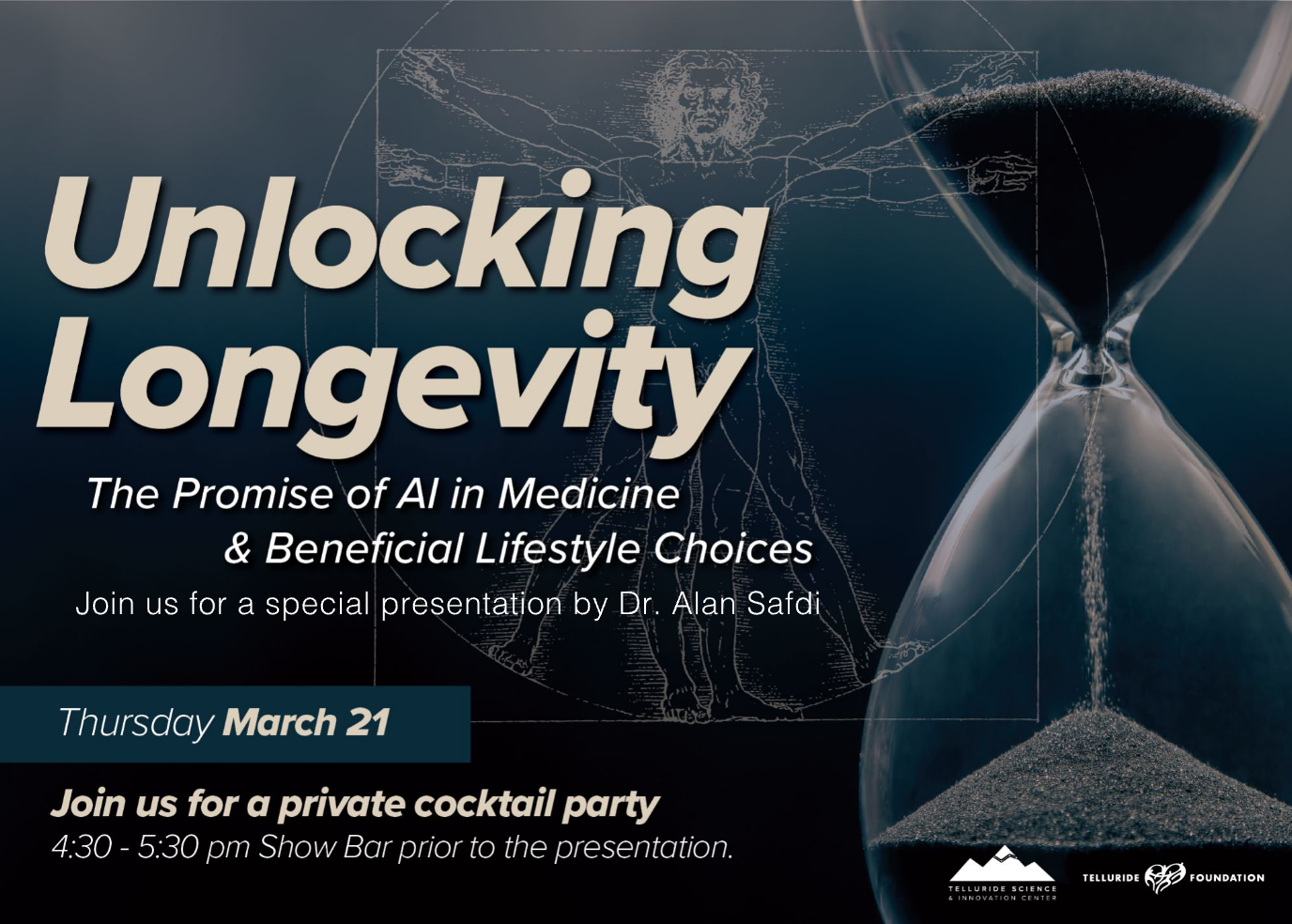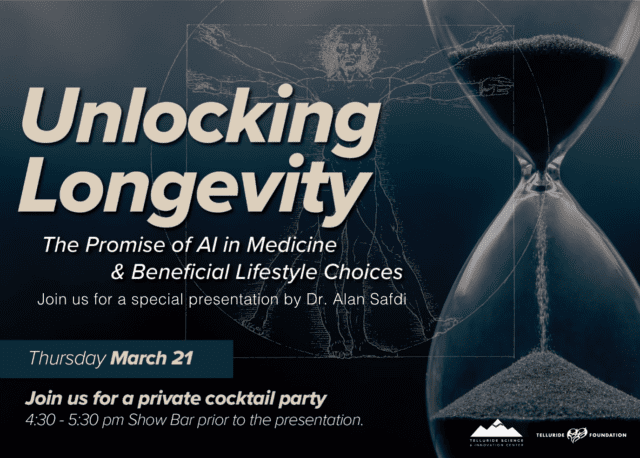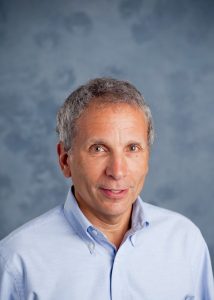
07 Mar Telluride Science & Foundation: “Unlocking Longevity,” with Dr. Alan Safdi, 3/21!
Telluride Science and the Telluride Foundation host part-time local Dr. Alan Safdi for a program titled “Unlocking Longevity.” The event is FREE and open to the public.
Visit telluridescience.org to learn more about the non-profit organization and the capital campaign to transform the historic Telluride Depot into the Telluride Science & Innovation Center. The venue will be permanent home for Telluride Science and a global hub of inspired knowledge exchange and development where great minds get to solve great challenges.
Go here for more on Telluride Science.
Go here for more on the Telluride Foundation.
Go here for more health- and wellness-related posts featuring Dr. Alan Safdi.

“Wheel of Life” is a Buddhist trope and a well-worn cliche, as is “What goes around, comes around. Everything old is new again.”
Or, simply put, life defined as a circle game.
And that includes conversations around longevity, which feature attempts to secure immortality by defining aging as a disease to be conquered. Or in Silicon Valley, a code that can be hacked for the greater good.
Conversations, real or metaphorical, about fountains of youth, however, are not new. In fact, they date back thousands of years.
Such tales appeared in the writings of Herodotus (5th century BC); in stories of Alexander the Great (3rd century AD); and those about Prester John (early Crusades, 11th/12th centuries AD). They featured prominently among the people of the Caribbean in the early 16th century, and so on and on… The legend of springs which allegedly restored the youth and vitality of anyone who bathed in its waters, became particularly prominent when the notion got joined at the hip with the Spanish explorer Juan Ponce de León, who was supposedly searching for the Fountain of Youth when he and his crew traveled to Florida in 1513.
Fast forward to the present when Silicon Valley enters the picture.
Tech billionaire Peter Thiel may be best known for co-founding companies like PayPal and Palantir Technologies, but he has also funneled millions into the field of longevity research. His Breakout Labs is focused on the humble goal of “reprogramming nature.”
Oracle founder Larry Ellison has devoted millions over the years to fighting what he sees as the mysterious phenomenon of death: “Death has never made any sense to me. How can a person be there and then just vanish, just not be there?,” Ellison told his biographer.
In 2013, Google co-founder Larry Page announced the launch of an anti-aging endeavor he called the California Life Company, more commonly known as Calico Lab. The initiative’s goal, per its website— which falls under the umbrella of Google’s parent company, Alphabet— is to research aging and develop medicines to combat age-related diseases.
Meta’s Mark Zuckerberg has also long been preoccupied by questions of life and death.
Jeff Bezos has also gotten into longevity investment game in recent years.
And OpenAI CEO Sam Altman has invested some of his wealth into extending the human lifespan. Altman purportedly believes that the world of longevity needs a “OpenAI-type effort.” In other words, a major game-changer.
Yes, longevity—a quest as old as humanity itself—has continued over the ages to make big headlines. It is a buzzword appearing everywhere now from specialty gyms such as New York’s Longevity Lab to an IV formula which promises to “turn on good genes,” not to mention growing shelves of special supplements and countless breathless headlines.
Truth be told, the longevity sector, according to some industry analysis, is on track to be a multi-trillion-dollar industry. In fact, the dollars spent to date in this sector are jaw-dropping. According to online sources, over $60 billion so far on anti-aging initiatives, a number projected to top $120 billion over the next decade plus.
So are we now a world in which we can train our immune system to fight cancer; edit our DNA to avoid a certain unhappy fate; erase the risk of a heart attack; reverse aging; and know exactly which drugs to take to optimize health with zero side effects?
Are we there, hallelujah?
Longtime, part-time Telluride local Dr. Alan Safdi will answer those and other questions about longevity and anti-aging initiatives that make sense as guest speaker at a talk aptly titled “Unlocking Longevity.” The event is co-hosted by Telluride Science and the Telluride Foundation and takes place Thursday, March 21, at the historic Sheridan Opera House. Donor cocktail party is 4:30 p.m.; Presentation, 5:30 p.m.
Safdi has been there and done that before. He addressed the subject of longevity at his once popular “Live Longer Retreats” in Telluride, where he offered tips for aging gracefully and extending our health span through practical lifestyle tweaks.
To set the table for Safdi’s talk, check out the following interview:
TIO: Let’s begin by defining aging. Physically, physiologically what happens in our bodies over time and can what happens when we age be mitigated and/or reversed? In other words do you think aging can reasonably be defined as a disease that can be cured or as a code that can be hacked?
AS: I doubt aging has a cure. The better question is can aging be slowed down?
Aging is a complex multifactorial biological process shared by all living organisms. It shows up as a gradual decline of normal physiological functions in a time-dependent manner. Over time, cells in the body accumulate damage from various sources such as oxidative stress, DNA damage, and metabolic processes. This damage can lead to cellular dysfunction and contribute to aging-related decline. We look at a variety of physiological markers in both short- and long-term clinical and epidemiological trials.
All of us age at different rates, but there are many things we can do to slow the aging process. The medical community looks at a lot of variables including strength, sleep, stress, diet, exercise, blood pressure, family history, VO2 max, blood work, etc. to gain insights as to how it all happens.
Chronological aging holds significant importance for human health because it increases susceptibility to many diseases, including cancer, metabolic disorders, such as diabetes, cardiovascular disorders, and neurodegenerative diseases.
In summary, while aging cannot be completely halted or reversed, there is growing interest and research in interventions that could mitigate its effects and improve overall health and longevity.
TIO: What basic biomedical research on aging based on understanding lifespan development processes and age-related diseases and disabilities is out there that makes sense to you and could be actionable?
AS: Cellular senescence, the irreversible arrest of cell proliferation, is implicated in aging and age-related diseases. Understanding the triggers and consequences of cellular senescence could provide opportunities for developing therapies to delay aging and prevent age-related diseases.
Stem cells are a fascinating area of research. Investigating the underlying mechanisms of age-related changes in immune function and inflammation could lead to the development of interventions to modulate immune responses and mitigate age-related inflammatory conditions. Stem cells play a crucial role in tissue regeneration and repair throughout life. Research into stem cell biology, including the identification of stem cell populations and mechanisms regulating their function could well lead to strategies for enhancing tissue regeneration and combating age-related decline in various organs.
By advancing our understanding of these fundamental aspects of aging biology, basic biomedical research has the potential to identify novel targets for interventions aimed at promoting healthy aging, preventing age-related diseases, and improving quality of life in older adults.
Translation of these findings into actionable interventions may involve the development of pharmacological agents, lifestyle interventions, or therapeutic approaches targeting specific pathways implicated in aging and age-related diseases.
TIO: It has been over a decades since Dr. David Sinclair, a professor of genetics and co-director of the Paul F. Glenn Center for Biology of Aging Research at Harvard Medical School, and his colleagues answered the question about what drives aging. My understanding of their theory is that aging is not a result of genetic mutations in our DNA, rather aging is directed by our epigenome. Do you agree? Even if you agree with a qualified “yes,” please explain.
AS: I only partially agree. It would be naive of me to ignore our basic DNA and inherited and acquired mutations. Some people are born with definite predispositions to cancer, dementia, and cardiovascular disease. Having that knowledge can help us prevent or mitigate those diseases.
Although longevity studies on the human population have shown that genetic factors can explain a fraction (20 to 30%) of the differences observed in life spans of mono-zygotic twins, the majority of the remainder of variations are thought to have arisen through epigenetic drift during their lifetime.
Our habits and environment play a large role in a DNA sequence and can affect the way our genes function. Over time, the epigenome undergoes alterations in response to various internal and external factors, including environmental stressors, lifestyle choices, and metabolic changes. These epigenetic changes can accumulate with age and contribute to the dysregulation of gene expression patterns observed in aging cells and tissues.
TIO: Do you agree with the medical community changing the discussion from lifespan to health span, from chronological age to biological age? If yes, please explain.
AS: Absolutely agree, since this change reflects a more holistic and nuanced approach to understanding and promoting overall well-being as individuals age. Chronological age is simply the number of years a person has been alive, whereas biological age reflects the physiological condition of an individual’s body and takes into account factors such as cellular aging, organ function, and overall health.
By focusing on extending the period of healthy living and considering individual variations in biological aging, healthcare providers can better support individuals in achieving optimal health and well-being as they age.
TIO: One highly publicized experiment found the muscles, brains and organs of old mice were partially rejuvenated when they shared the blood of a young animal. (The younger animals, in return, appeared to age.) Your thoughts?
AS: Scientists are still trying to establish which blood components are behind the effect, with a view to slowing dementia and other age-related diseases. Findings from these studies suggest that factors presented in the blood of young animals can have rejuvenating effects on certain tissues and organs in older animals. Conversely, exposure to the blood of older animals appears to accelerate the aging processes in younger animals. However, we are still not sure which components in the blood account for these changes. Things such as growth factors, cytokines, and T cells could be part of the story and result in regulating cellular processes such as inflammation, stem cell function, and tissue repair, which are important for maintaining tissue homeostasis and resilience to aging-related stressors.
But always remember animal studies often do not translate into the same results in humans.
TIO: Bryan Johnson is the increasingly renowned 45-year-old software billionaire on a quest to reverse his biological age and become immortal. The man willing takes over 100 pills a day, exercises like a maniac and more over-the-top antics (like monitoring his erections while he sleeps) on his quest to live forever. He also has started a movement under the banner “Don’t Die.” Care to comment? Does anything Johnson is doing make sense to you?
AS: Would that the man were correct, but unfortunately we cannot buy our way into immortality. Commitment to health and longevity is commendable, but many of Johnson’s approaches lack scientific evidence and could even be harmful. Taking an excessive number of pills, for example, can lead to adverse effects or interactions between medications. It is essential to base interventions aimed at promoting health span and longevity on rigorous scientific research and evidence-based practices. It’s important to prioritize holistic well-being, including physical, mental, and social aspects of health, rather than solely focusing on extending lifespan.
TIO: Johnson as you well know is not alone. Bezos and Thiel and other billionaires, as mentioned above, are pouring huge sums of money into start-ups aimed at keeping us all young and healthy into our later years. One of their aims is to find ways to rejuvenate human cells to stave off the diseases of old age that inexorably drive us to the grave, transforming old age from something to be endured into a period of life to be fully enjoyed. Do you see their efforts as worthwhile or the vanity projects of people with too much money and time on their hands?
AS: Since this type of research has the potential to accelerate scientific discoveries and technological innovations aimed at addressing age-related diseases and extending health span it could prove to be extremely valuable. By supporting research into cellular rejuvenation, regenerative medicine, and other cutting-edge approaches, these men could contribute to advancements that benefit not only the wealthy, but also society as a whole.
TIO: In what is arguably a new golden age in medicine (and science in general), do you think we can leverage the power of technology to customize our self-care and third-party care?’ What is the role of AI in a discussion on aging – or anti-aging?
AS: Unfortunately, healthcare providers cannot take in and monitor all the data points, sometimes into the thousands, that are available on individual patients. There is no way possible to continually take into account our labs and trends, pulse-rate variability, VO2 max, entire family history for generations, genetic data, our diets in detail, including the appropriate consumption of antioxidants, exercise patterns and so on.
Also we need to consider exercise ability degradation, grip strength trends, visceral fat, medications and possible food or drug interactions, past medical personal and family history and trends in vital signs, appropriate screening tests, etc. By harnessing the power of technology and AI-driven solutions, we can revolutionize how we approach aging, empower individuals to take control of their health, and advance scientific discoveries to extend health span and improve quality of life in later years.
We can revolutionize drug develop by using AI to search huge databases and expedite drug development by years. We need to have AI as a tool, but not one that replaces the physician. AI can act as an assistant just as your car has lane departure alerts, crash avoidance systems, etc. We already use the technology in a variety of ways to improve healthcare and that will continue to expand despite some inherent risks.
One of the most exciting developments will be a patient-driven AI application that can take into account all of our data points and more mentioned above. At that point, AI becomes a patient-driven wellness assistant.
Dr. Alan Safdi, more:

Dr. Alan Safdi the Chief Medical Officer Quadrant Health, co-owned by Stanford University and Mayo Clinic. He also serves as CEO of MD Health and medical director of the Telluride Longevity Institute and Veterinarian Endoscopy Institute.
Safdi was chair of the section of gastroenterology at Deaconess Hospital and Ohio GI; co-founded eMerge Health Solutions; consults for clinical research, pathology and anesthesia outpatient programs; and for multiple outpatient endoscopy centers.
And Safdi has been an investigator in almost 1000 research studies and counting…
Safdi is an internist and gastroenterologist in Ohio and Colorado, who received his medical degree from University of Cincinnati College of Medicine and did his residency at the University of California.
Safdi is experienced in inflammatory bowel disease, colorectal cancer screening, clinical research, colon cancer, and ulcerative colitis and Crohn’s disease.
Safdi not only lectures on GI topics, but also on health, wellness and longevity and he puts out a wellness evidence-based newsletter and Apple podcasts on such topics.


Sorry, the comment form is closed at this time.